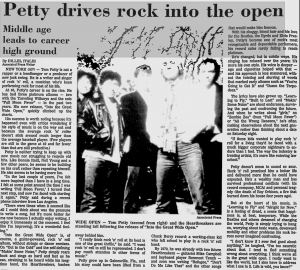Petty drives rock into the open: Middle age leads to career high ground
By Hillel Italie
Kentucky New Era - August 16, 1991
NEW YORK (AP) -- Tom Petty is not a rapper or a headbanger or a producer of new jack swing. He is a writer and singer of rock 'n' roll, a musician who's been performing rock for most of his life.
At 40, Petty's career is on the rise. He has had three platinum albums -- two with the Traveling Wilburys and the solo "Full Moon Fever" -- in the past two years. His new release, "Into the Great Wide Open," quickly climbed up the charts.
His success is worth noting because it's happened even with critics wondering if his style of music is on the way out and because the average rock 'n' roller doesn't stick around much longer than the average baseball player. (Few players are still in the game at 40 and far fewer than that are still productive.)
Petty is neither trying to keep up with new music nor struggling to recycle old hits. Like Bonnie Raitt, Neil Young and a few other peers, he seems to be building on his craft rather than repeating himself. He also seems to be having more fun.
"In the last couple of years, I've felt more inspired than I have in a long time. I felt at some point around the time I was writing 'Full Moon Fever,' I turned that next step, and now I'm faced with starting it again," Petty said during a recent phone interview from Los Angeles.
"There were times when it seemed like all I could think about was the pressure to write a song, but it's more better for me now because I actually enjoy writing, I enjoy it immensely at the moment. I feel like I'm improving. It's a wonderful feeling."
"Into the Great Wide Open" is, of course, a guitar-powered, rock 'n' roll album, without strings or dance remixes. On "Out in the Cold" and the self-defining "Makin' Some Noise," Petty simply rears back and sings as hard and fast as he can, straining to be heard while his long-time band, the Heartbreakers, bashes away behind him.
"I really think rock 'n' roll at its best is one of those great thrills," he said. "I want rock 'n' roll to still be represented. I don't pay much attention to other forms of music."
Petty grew up in Gainesville, Fla., and his story could have been lifted from a Chuck Berry record: a working-class kid who left school to play in a rock 'n' roll band.
By 1970, he was already with two future Heartbreakers -- guitarist Mike Campbell and keyboard player Benmont Tench -- and soon was writing "Refugee," "Don't Do Me Like That" and the other songs that would make him famous.
With his shaggy, blond hair and his love for the Beatles, the Byrds and Elvis Presley, Petty's become one of rock's most recognizable and dependable performers, his record sales rarely failing to reach platinum.
He's changed, but in subtle ways. His singing has relaxed over the years; it's more his own style. His voice is deeper -- age and cigarettes helped with that -- and his approach is less mannered, without the twisting and slurring of words that marked early albums such as "You're Going to Get It" and "Damn the Torpedoes."
The lyrics have also grown up. "Learning to Fly," "Built to Last" and "Makin' Some Noise" are about endurance, surviving the past and confronting the future. And when he writes about "girls." on "Zombie Zoo" (from "Full Moon Fever") or "All the Wrong Reasons," he's often making observations about the next generation rather than thinking about a date on Saturday night.
"If these kids wanted to play rock 'n' roll for a living they'd be faced with a much bigger corporate nightmare to endure than I had. The way the industry is treating artists, it's more like entering law school."
Petty doesn't mean to sound so sour. Rock 'n' roll promised him a better life and delivered more than he could have expected. He's a wealthy man and has survived professional conflicts (with his record company, MCA) and personal tragedy (the death of Roy Orbison, a fire that burned down his house four years ago).
But at the heart of his music, in "Learning to Fly" and "Alright for Now," is a feeling of dread, a sense that happiness is, at best, temporary. While the Beatles and others dreamed of changing the world, Petty is simply trying to hang on, worrying about toxic waste, downward mobility and other problems his rock heroes never imagined confronting.
"I don't know if I ever feel good about anything," he laughed. "I'm too neurotic about that. I tend to find something wrong about everything. I think we're all in the great wide open. I really want to like the world, but I also have to address what I see in it. Life is wild, you know?"

